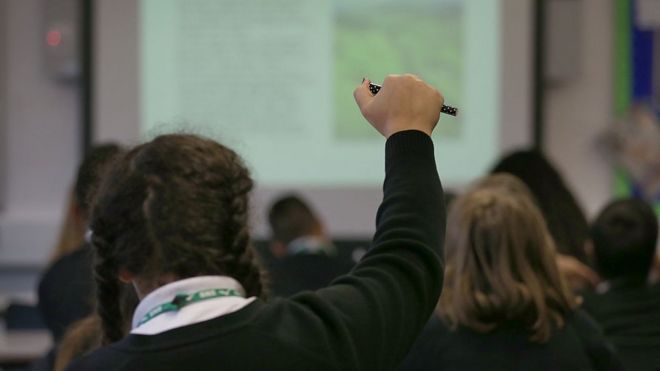
Nineteen academy schools are to be investigated for “flouting” rules on transparency following a BBC investigation.
The schools have not published a register of all their governors’ interests, against official rules.
Education campaigners say there is “a culture of secrecy” around some academies.
The Department for Education (DfE) said the “rules were clear” and it would investigate.
BBC England’s data unit selected 100 academies across England at random and found 19 of them had not either published a current register of interests for governors on their school or trust websites, or had only given the interests of directors and members.
There are 5,758 academies in England, making up more than a quarter of state-funded schools.
Guidance to academies produced by the DfE makes clear that academy trusts must declare business and pecuniary interests of “members, trustees, local governors…and senior employees”.
And it states: “Trusts must publish on their websites relevant business and pecuniary interests of members, trustees, local governors and accounting officers.”
The publication of interests by schools allows parents and other interested parties to see the background and business links of governors and academy trustees, including any potential ways they could benefit financially.
BBC News has chosen not to publish the names of schools while the DfE looks into the findings.
Academies in numbers
5,758
academies in England
28%
of all state-funded schools
- 3,430 primary acadamies
- 2,068 secondary academies
- 260 special and alternative provision
- 1,004 school in the pipeline to become academies
Critics of the conversion of schools into academies say it shows how the system can be open to abuse.
Chris McGovern, of the Campaign for Real Education, said: “As a former chairman of an academy trust and a strong supporter of the academy programme, it is, nevertheless, clear to me that that the Achilles heel of the academy system is the probity of its financial management at the level of individual academy chains and individual schools.
“A lack of effective supervision and policing has made the system wide open to potential abuse.”
He said there was “clear evidence of a culture of secrecy and concealment that, too often, permeates academy business”.
Russell Hobby, general secretary of the National Association of Head Teachers, said: “Education, rightly, is still a highly trusted sector and we should not do anything to endanger that.
“Education is now a high stakes and highly scrutinised business. It is important that schools lead by example, and demonstrate a gold-standard approach to financial matters.”
A spokesman for the DfE said it would look into the findings of the investigation.
“The rules are clear that trusts must publish interests of members and trustees, so that conflicts of interest are avoided,” he said.
“They must also publish annual audited accounts which are also submitted to the Department for Education.
“This system of financial oversight and accountability is more transparent and more robust than for council-run schools. We take any breaches seriously and where trusts are found to be flouting the rules, we will not hesitate to take action.”
Academies are independent, state-funded schools that get their funding directly from central government, rather than through a local authority.
They were originally devised as a way of improving struggling schools, particularly in deprived areas. However, all schools, regardless of their success, have been invited to become academies.
There were plans to make all schools in England academies but they were abandoned following criticism from teaching unions, Conservative MPs and councillors among others.
[Source:- BBC]








